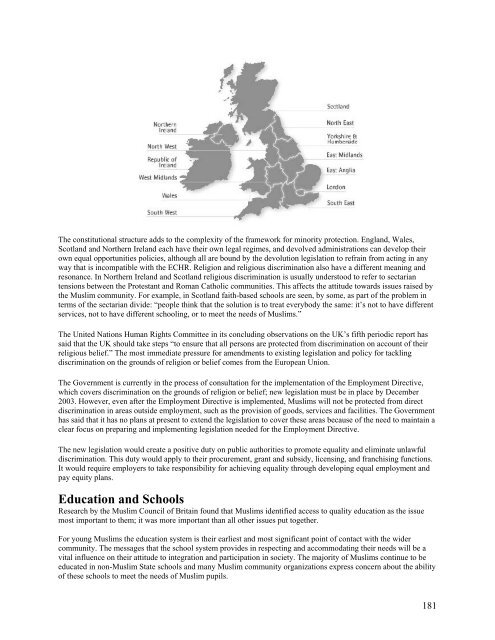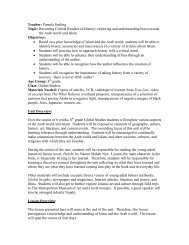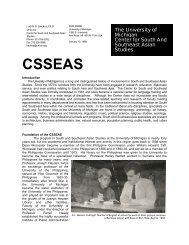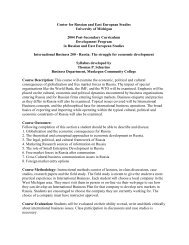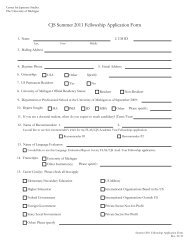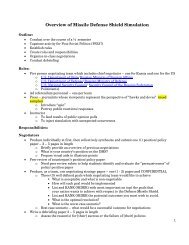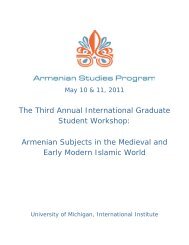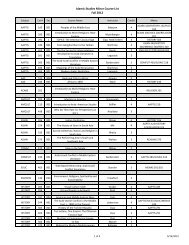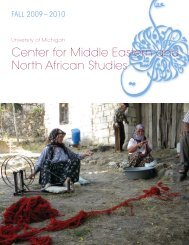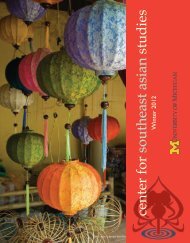Muslims in Europe: - International Institute - University of Michigan
Muslims in Europe: - International Institute - University of Michigan
Muslims in Europe: - International Institute - University of Michigan
You also want an ePaper? Increase the reach of your titles
YUMPU automatically turns print PDFs into web optimized ePapers that Google loves.
The constitutional structure adds to the complexity <strong>of</strong> the framework for m<strong>in</strong>ority protection. England, Wales,<br />
Scotland and Northern Ireland each have their own legal regimes, and devolved adm<strong>in</strong>istrations can develop their<br />
own equal opportunities policies, although all are bound by the devolution legislation to refra<strong>in</strong> from act<strong>in</strong>g <strong>in</strong> any<br />
way that is <strong>in</strong>compatible with the ECHR. Religion and religious discrim<strong>in</strong>ation also have a different mean<strong>in</strong>g and<br />
resonance. In Northern Ireland and Scotland religious discrim<strong>in</strong>ation is usually understood to refer to sectarian<br />
tensions between the Protestant and Roman Catholic communities. This affects the attitude towards issues raised by<br />
the Muslim community. For example, <strong>in</strong> Scotland faith-based schools are seen, by some, as part <strong>of</strong> the problem <strong>in</strong><br />
terms <strong>of</strong> the sectarian divide: “people th<strong>in</strong>k that the solution is to treat everybody the same: it’s not to have different<br />
services, not to have different school<strong>in</strong>g, or to meet the needs <strong>of</strong> <strong>Muslims</strong>.”<br />
The United Nations Human Rights Committee <strong>in</strong> its conclud<strong>in</strong>g observations on the UK’s fifth periodic report has<br />
said that the UK should take steps “to ensure that all persons are protected from discrim<strong>in</strong>ation on account <strong>of</strong> their<br />
religious belief.” The most immediate pressure for amendments to exist<strong>in</strong>g legislation and policy for tackl<strong>in</strong>g<br />
discrim<strong>in</strong>ation on the grounds <strong>of</strong> religion or belief comes from the <strong>Europe</strong>an Union.<br />
The Government is currently <strong>in</strong> the process <strong>of</strong> consultation for the implementation <strong>of</strong> the Employment Directive,<br />
which covers discrim<strong>in</strong>ation on the grounds <strong>of</strong> religion or belief; new legislation must be <strong>in</strong> place by December<br />
2003. However, even after the Employment Directive is implemented, <strong>Muslims</strong> will not be protected from direct<br />
discrim<strong>in</strong>ation <strong>in</strong> areas outside employment, such as the provision <strong>of</strong> goods, services and facilities. The Government<br />
has said that it has no plans at present to extend the legislation to cover these areas because <strong>of</strong> the need to ma<strong>in</strong>ta<strong>in</strong> a<br />
clear focus on prepar<strong>in</strong>g and implement<strong>in</strong>g legislation needed for the Employment Directive.<br />
The new legislation would create a positive duty on public authorities to promote equality and elim<strong>in</strong>ate unlawful<br />
discrim<strong>in</strong>ation. This duty would apply to their procurement, grant and subsidy, licens<strong>in</strong>g, and franchis<strong>in</strong>g functions.<br />
It would require employers to take responsibility for achiev<strong>in</strong>g equality through develop<strong>in</strong>g equal employment and<br />
pay equity plans.<br />
Education and Schools<br />
Research by the Muslim Council <strong>of</strong> Brita<strong>in</strong> found that <strong>Muslims</strong> identified access to quality education as the issue<br />
most important to them; it was more important than all other issues put together.<br />
For young <strong>Muslims</strong> the education system is their earliest and most significant po<strong>in</strong>t <strong>of</strong> contact with the wider<br />
community. The messages that the school system provides <strong>in</strong> respect<strong>in</strong>g and accommodat<strong>in</strong>g their needs will be a<br />
vital <strong>in</strong>fluence on their attitude to <strong>in</strong>tegration and participation <strong>in</strong> society. The majority <strong>of</strong> <strong>Muslims</strong> cont<strong>in</strong>ue to be<br />
educated <strong>in</strong> non-Muslim State schools and many Muslim community organizations express concern about the ability<br />
<strong>of</strong> these schools to meet the needs <strong>of</strong> Muslim pupils.<br />
181


